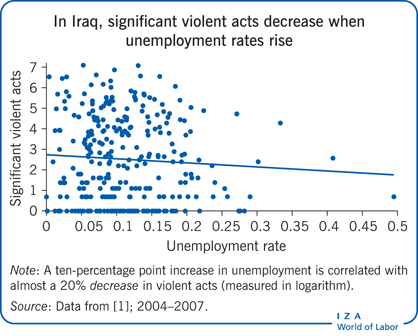Elevator pitch
In addition to the heart-breaking human costs, violent civil rebellion is a cause of chronic economic under-development. Employment programs with former combatants and at-risk youth have improved their livelihoods, but not their support for non-violence and respect for law. Rebel groups provide security and social benefits that formal employment does not offer, possibly making switching out of rebellion into formal employment unappealing. However, a jobs program that addressed the psycho-social motivations to join rebel groups resulted in significant reductions in crime and violence. This is an important step forward in our understanding of how to lure people away from violent rebellion.
Key findings
Pros
The economic idea of “opportunity cost” suggests that rebels should be willing to switch out of rebellion as soon as sufficiently lucrative and formal employment opportunities become available.
Civil violence can increase following negative economic shocks, as the resulting unemployment releases a pool of labor for rebel groups.
Unemployment may create an aggrieved underclass susceptible to rebel recruitment.
People who have steady jobs may become more responsible, less violent, more respectful of authority, and invest more in their communities.
Cons
Rebel groups may offer personal security for people in fragile states that is not otherwise available through formal employment.
Participation in rebellion offers a number of social benefits, such as a sense of contributing to an important just cause, that are not offered through formal employment opportunities.
Studies have failed to provide a clear causal link between unemployment and civil war violence.
Improving ex-combatants’ and at-risk youths’ livelihoods does not make their political and social views less violent or more respectful of legal authority.
